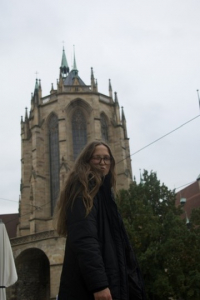Halfway Done???
/in Berlin, Germany Fall 2025 MunsonI can not believe I am writing this blog post right now. Looking back at my experience so far, I am overwhelmed with good memories, ones that I’ll cherish forever. Not only have I pushed myself out of my comfort zone and tried new things, but I have learned so much about myself. If you ever find yourself traveling abroad, especially if it’s solo, you are going to learn SO much about yourself. You’ll figure out how to navigate your feelings better, and get a clearer understanding of who you are as a person. I came into this experience of study abroad fairly comfortable and confident with myself, but, wow, has this experience taught me so many things, and these are things that I would never have found out about myself if I had stayed where I was.
During your time traveling, I’ve found it’s so important to take time to experience things for yourself. Slow down, process, and cherish every moment. Day in and day out, I feel very blessed to be able to be here studying in Germany.
When I first arrived, I gave myself some goals to try and improve. I feel like I have made the most progress on speaking German and really taking time to slow down and appreciate moments.
It’s crazy how helpful and beneficial being in Germany has been for improving speaking German. It definitely makes a world of a difference to be able to learn it in the morning and immediately be able to speak it with locals the rest of the day. On that same note, I am really proud of how my confidence in approaching German people to speak with them has improved. That was a dream of mine, and it is awesome to see it become more of a reality every day.
Looking ahead to this next final part of my semester, I hope to keep improving this even more. I would also like to maintain a better sleep schedule, fingers crossed, as well as make sure I’m eating breakfast every day (food is fuel!). Getting enough sleep is not only essential for brain function, but it also helps keep you healthy and gives your body time to recover, which, as Berlin starts to get colder and more rainy as we approach winter, is something my body desperately needs. As for breakfast, it’s important for me to eat something, even if it’s not a lot. No one wants to have a rumbling stomach in their morning German class 😉
All in all, my opinion of German culture remains high. They have surprised me though! After being here for several months, I do not find them cold or uninviting at all. In fact, I have been treated with so much hospitality that I wish to carry that mindset, how to host and treat others with hospitality back with me to the US. If you take the time to talk to and get to know a German, they are so friendly and welcoming. Before I arrived, I had only learned that the Germans were a “cold” culture, but I do not believe that to be the case. As a whole, they may be more reserved, yes, but I have had too many lovely conversations with Germans to label them as “cold.” This factor has helped me greatly improve my confidence in approaching people, which was a major goal of mine coming to study abroad.
I hope everyone at home is doing well! I miss all of you so much!
Tschüss!
(Below is a panoramic view of Berlin in fall and a picture of my chai, which I have started making as a nice warm treat as the weather begins to get colder.)


Blog #5 We’re halfway there! Wo-oah! Living on a prayer!
/in Limerick, Ireland Fall 2025 KopplinIt’s the halfway point blog! In this blog, I’ll reflect on experiences and goals and evaluate the last half of this experience.
“And surely I am with you always, to the very end of the age.” Matthew 28:20b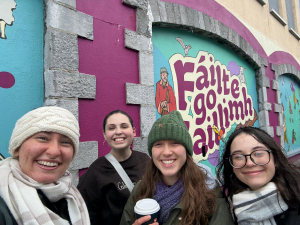
Let’s be real for a moment. I’m in another country. Crazy. I still don’t really believe it. It’s not easy either. Yes, it’s fun and exciting, but I didn’t stop to process enough that those feelings will wear off eventually. Yes, I learned about culture shock, but I didn’t know what to expect. When will it hit? Is it like one big moment or a very gradual thing? Will it wear off? How long could it take? What will it feel like?
“And surely I am with you always, to the very end of the age.” Matthew 28:20b
Homesickness is real. I’m not homesick for a place. I miss my fiancé. I miss my friends. I miss my family. I miss the laughs and memories we make when we’re together. I miss people I know. Don’t get me wrong, I’m having fun and making many memories! My housemates are fantastic, and we love hanging out together. We just had a mid-term for the academic semester. Assignments are coming due every week. Thanksgiving is around the corner. We don’t get Thanksgiving break. Christmas decor is going up and is in stores all over the place. I’m looking forward to Christmas, family, and memories. I love the anticipation of Christmas, but it’s coming earlier than usual. Being at a higher latitude than the US is different. It was completely dark by 5:30 pm today. So in my mind, it’s later in the year than usual, and Thanksgiving is less than a week away (not a month). Then the music can be played and the tree can go up.
“And surely I am with you always, to the very end of the age.” Matthew 28:20b
I have gotten out of my comfort zone more than usual. And to be honest, I don’t always know where my comfort zone is now. I have learned so much while here, most of it not from classes. I have gained so many new experiences and learned from them. I have learned how to navigate using public transportation. From taking buses and trains across the country, purchasing tickets, taking the bus across town, or just walking and navigating the city, I’ve become more comfortable with navigating unfamiliar places. This is a goal accomplished. I have attended the Christian Union Society (a club) multiple times. I’m still not completely comfortable, but I’ve definitely improved. This is a goal in progress. It’s hard to enrich connections with those who are far away. But the fun part is planning and anticipating the sweet reunion and hugs to come. Calling and just talking isn’t always my cup of tea. I like doing things and making memories. This is a goal in progress.
“And surely I am with you always, to the very end of the age.” Matthew 28:20b
Where can I improve? I’ve got more than three. But that’s what we’ll stick to. 1) Planning things to do with my people in the States. Minecraft? Games? 20 questions? Digital escape rooms? All things I’ve done or thought about. 2) Devotions and livestreaming church. Getting to a WELS church is not possible here. There are none. The closest one is in London. Did you hear a good sermon? Share it with me! Read a good bible passage? Send it my way! Text or Facebook Messenger is great! 3) Motivation for school work. What I learn is applicable and fun. But I need a better homework motivation schedule. Most of the time, I don’t want to sit in my apartment and do homework.
“And surely I am with you always, to the very end of the age.” Matthew 28:20b
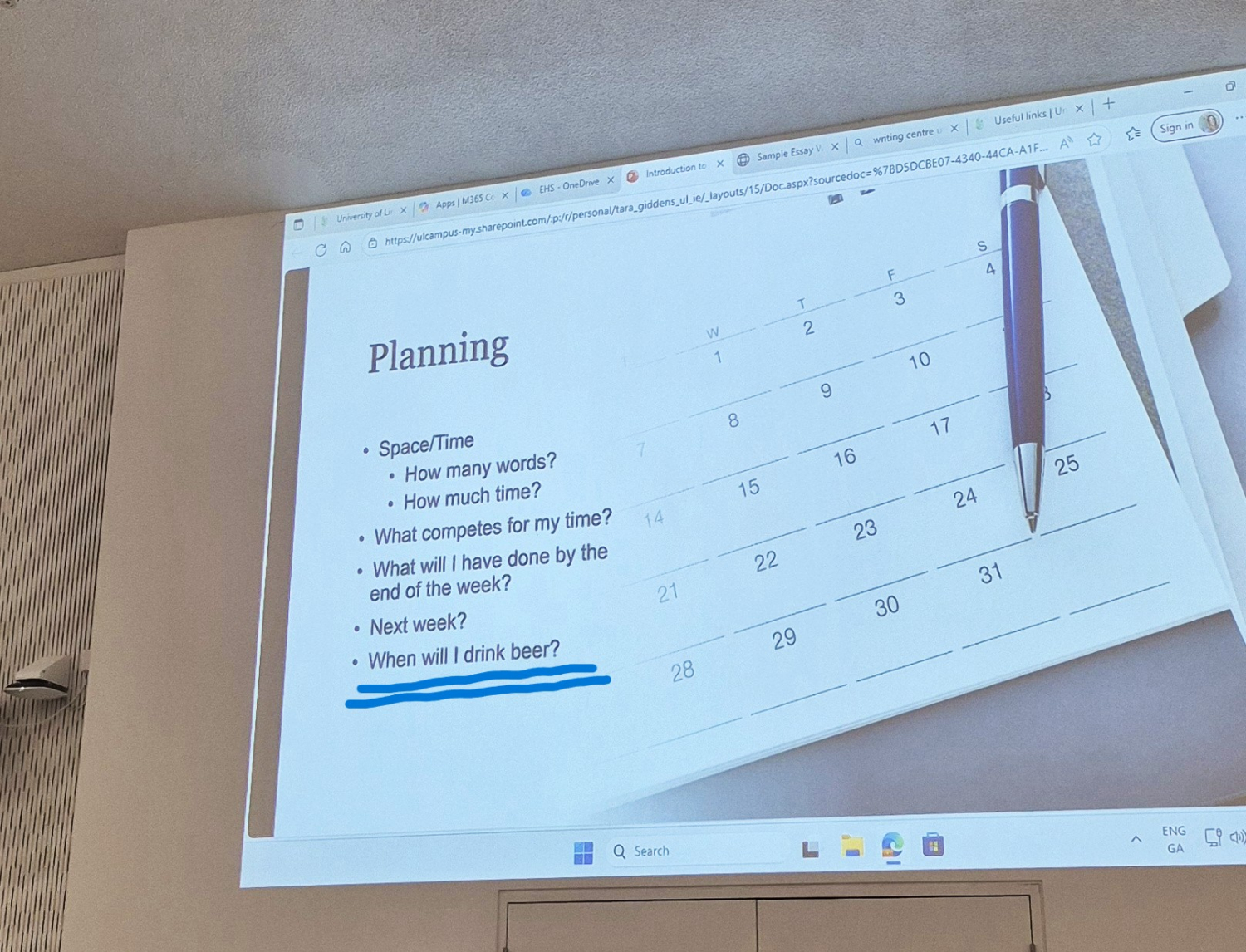
I was surprised how similar it was to the US. There are still some significant differences, such as Ireland being more of a being culture than a doing culture. In the US, everyone is always go-go-go, but Ireland is a bit more laid back. In my education course last week, a guest speaker gave us information on the writing center, telling us tips and tricks for planning to write a paper (this class is mainly for first-year students). When discussing planning to write our paper, she told us to put a beer break in the schedule. No joking. She said, “And think about when you will have a beer in there.” I was stunned. I love how the Irish people aren’t as focused on every task they have to do. They take time to live and just to be. I did not know this before, and it has changed my opinion that we all could use a little break. We only get one life. Why rush through it? God has blessed us with time with our families and friends on this earth. Don’t ignore that. Don’t toss it away. Don’t live to work. Work to live. Take time just to be.
“And surely I am with you always, to the very end of the age.” Matthew 28:20b


Song to check out! → “Across the Pond” by JigJam
Song to check out! → “Young Again” by Barry Kirwan
Halfway There
/in Berlin, Germany Fall 2025 WagnerI’ve just returned to Berlin from a week-long break in Italy. Now I’ve realized that my time abroad is halfway over. I definitely see it from the opposing side: I only have half my time left here. The first half of my semester has been great, and I am excited for the second half as well. Unfortunately, the second half of this semester is going to be very cold and wet.
I have made good use of my time here in Germany and throughout Europe to get out of my house and area, and see and experience new things. I’ve definitely grown in my confidence to speak German in the wild as well. The other night, I was out and about doing night photography and ran into another person doing the same thing. I started asking him questions in German, and it went well. I plan to continue this trend of getting out and speaking, even as the weather gets colder and more challenging, making it harder to want to leave the warmth and comfort of my house.
My goal of speaking to new people in German is going well. Often, these interactions are not super long, but they are still beneficial. These interactions are both intentional and forced, so sometimes I go out of my way to talk to someone, and at other times, I have no choice but to do so. Another thing that is going well, honestly better than I thought it would, is my Church attendance. Given that I’m in a different country and travel frequently on weekends, I’ve attended about 5 ELFK services so far, which is more than I initially thought I would. ELFK is the German church with which we are in fellowship. Honestly, that has been an enormous blessing to be able to hear God’s word and sing his praises in a familiar manner.
As I move into the second half of the semester, I also have some areas for improvement. Number one is my daily devotion habits, as I was on it every day for some weeks, but with the week-long school excursion, my semester break, and other travels, I have definitely fallen behind where I want to be. That is what I want to definitely get on top of soon. Another thing I want to improve is keeping my private journal up to date, as I often fall a week or two behind. It would be nice to be up to date. The final thing to improve is using my limited time to its fullest, as many hours of my week are spent on transit.
Free water is scarce here; even now, as I’m writing this, I’m parched, and throughout the school, I don’t think a bubbler exists. Even in restaurants, water is paid for. I really want to ensure I’m drinking enough water as I continue, because I haven’t been. Overall, I still thoroughly enjoy Berlin, and each day brings something new to discover or learn about, primarily due to its rich history.

This picture I took the other day while exploring, and maybe you might recognize it from several movies such as The Hunger Games: Mockingjay Part 2 or The Bourne Supremacy
Cheers to Part Two!
/in Dublin, Ireland Fall 2025I decided that as an opening to my midterm blog, I would share an ode to the thing that I have found myself longing for the most- my car. (Also, please note how I said ‘thing’ and not ‘person’. I feel the judgment already.) Anywho, here goes nothing…
Dearest auto
On these days of anxiety
I miss you so
Oh, how I long for your convenience
When my knees ache
After a long day
Even through your minor flaws
You always start
And you have a great stereo
Fear not, I will return home
Five quarts of oil in tow
Never to put off routine maintenance again
Ok, I admit, not my finest work, but it came from the heart. I have been pining for dear old Lafawnduh* since practically day one abroad. I miss the ease of access that her four tires and engine provide me. I was especially feeling it at 3:37 AM this fine day whilst awaiting my second bus of the morning on my way to the airport. What could have been a 40-minute drive from my apartment to the airport turned into a 2-plus-hour commute by public transport. A cheap commute, but yet another reminder of what I left behind.
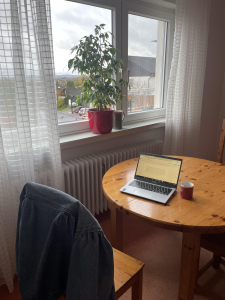 On that note, I do feel very accomplished having finally gotten a handle on public transport, specifically buses. I actively avoided them for a while, preferring to utilize the train and walk anywhere after that, but I quickly realized that not everything is conveniently close to said station, most importantly, the airport. I am proud to report, however, that after a couple of missed buses and a few anxiety-filled rides, I finally feel fairly confident about using Dublin buses. I have found that my confidence in general has risen since this triumph, especially after my most recent solo trek from my apartment to Frankfurt. Yes, ma’am, I made it all in one piece, and I only forgot an adapter. Oops! But luckily the Germans are very efficient and the local technology store outfitted me with another charging cable for only £4. I can now use my laptop in both the UK and Germany, but not in the US – peak comedy for this American writer. The picture on the left is what I would consider a peaceful moment in Germany- coffee and writing my blog while looking out the window to the village below.
On that note, I do feel very accomplished having finally gotten a handle on public transport, specifically buses. I actively avoided them for a while, preferring to utilize the train and walk anywhere after that, but I quickly realized that not everything is conveniently close to said station, most importantly, the airport. I am proud to report, however, that after a couple of missed buses and a few anxiety-filled rides, I finally feel fairly confident about using Dublin buses. I have found that my confidence in general has risen since this triumph, especially after my most recent solo trek from my apartment to Frankfurt. Yes, ma’am, I made it all in one piece, and I only forgot an adapter. Oops! But luckily the Germans are very efficient and the local technology store outfitted me with another charging cable for only £4. I can now use my laptop in both the UK and Germany, but not in the US – peak comedy for this American writer. The picture on the left is what I would consider a peaceful moment in Germany- coffee and writing my blog while looking out the window to the village below.
Ok, now that I’ve had a good laugh, I will move on. Along with gaining confidence through independence, I have also had some super fun experiences by going out of my comfort zone in order to interact with people on campus. Knowing that relationships are built on mutual respect and vulnerability, I have focused on breaking the ice with people by being semi-vulnerable from the start. The temptation to not reach out until another person reaches out first is very great, but I find that you have to ignore the feelings of pride in order to build relationships. By stepping outside of my comfort zone and approaching people, I have gained new friendships. Meeting for coffee often turns into multiple-hour conversations that span across at least two locations. My ideal friends? Chatty and ready for a laugh.
When it comes to my personal faith goals, I think that I could be doing better. I will not express all the details in length, but overall, I could always spend more time with God. I have found myself getting back into the habit of praying as I fall asleep and whilst walking from place to place. A silent stream of conscious prayer. This may not seem like a habit that is difficult to maintain, but to do so, one must think about it initially before it becomes a subconscious habit. When it comes to goals, however, I feel that the minute I put a numerical value or limit on the goal, I am less likely to have motivation to achieve that goal, so I will continue to take initiative to keep up with my faith by reaching for my Bible immediately after the thought pops into my head.
In regards to other goals, I am finding that the same is true. If I do not immediately seize the opportunity to do things, such as go for a run or go do homework in the library, I will not do them. I find some comfort in the fact that I am persistent, and I gain a lot of joy from completing tasks and looking back on a productive day. Along with that, my flatmates and I are reaching the point of real comfort; the point where being around them does not drain my social battery as much. Hanging out with them or just occupying the same areas while doing different activities does not leave me feeling tired like interacting with strangers does. We are not at the point of close friends, but I feel that their presence is more of a comfort rather than something that I have to escape from in order to decompress and go to bed. As a new goal for the second half of the semester, I will make an attempt to find a reliable place to study outside of my apartment. I will try to do all of my homework and studying, creating a separation between work and fun, and allowing my apartment to be a place of only relaxation. This plan will also force me to make it a habit to leave the house and interact with others outside of just classes. While I don’t find it difficult to approach people that I don’t know, I think that it will be good for me to have other people around to keep myself conscious on task.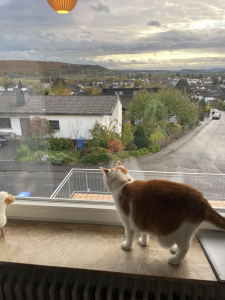
I’m hoping that any of that made sense to someone. Words are very difficult sometimes, no? Side tangent, really quick (feel free to skip to the next paragraph if you’re not interested, I’m not offended…) I am currently staying with relatives in Germany who learned to speak English many years ago, but, since then, have not used it very much. I have the same problem with my German. I can understand a great portion of what they say in German, but I am not confident in my speaking ability. As a result, I tend to respond to their German in English, but I try to put my English into German word order or use words that I know are similar to German words. In spite of the broken languages or language turnstile, if you will, we have had many lengthy and lively conversations. Ok, where did that come from? I suppose the point of the story is that, regardless of whether my way of communicating is exactly the same as someone else’s, we can both be flexible in order to be understood. Ah, also, if some of this is written in a strange syntax, kindly ignore my errors and continue reading. Or you don’t have to, I’m not going to stop you. I hope you enjoy a picture that needs no language to understand- a happy cat in a window : )
Okay, Mathilde, let us get past all these side tangents. I fear I have too much creative freedom with these blogs… that being said, I also feel that I have too much creative freedom over my schooling in Ireland. While I am only taking a few classes, I find it very strange that I have only had one assignment since starting school, and it is already midterm. As I said in my last blog, it is nice to not have homework, but I have learned its value over this past semester. I need some homework, although perhaps not as much as back in the US, in order to gauge my understanding of the material. On that same note, I am also surprised at the lack of noise in Ireland. While the people speak fairly loudly, in comparison to the US, they are much quieter. My flatmates and I were in a McDonald’s a couple of weeks ago, and we found that in a full restaurant, you can barely hear the people’s conversations next to you. It honestly makes me cringe to hear other Americans because they now seem so loud to me.
Another thing that I have been happily surprised with is the lack of high fructose corn syrup in products in Ireland. While it is not illegal to use as a sweetener, it is strictly regulated. Considering the fact that corn is not as readily available in Europe as it is in the USA and the fact that people in Europe are used to eating products that are sweetened with regular sugar, HFCS is not popular**. Considering the health concerns surrounding the product, I am very happy to avoid it, and I much prefer the less sweet products, including chocolate and even soda. Although too much sugar can still cause health problems, I believe that everything should be enjoyed in moderation, so I will continue to indulge in my £.95 dark chocolate Digestives from Aldi, along with my tuna salad. Please keep your opinions to yourself unless you’d like to join me; then, take a seat, and I’ll get you a plate.
Since I started this blog longing after something I miss, I figured I would end with something that I am grateful for in Ireland and that I will miss upon my arrival home in December- cheaper groceries and ease of access to stores. Since Ireland is much smaller than the US, things are closer together and are built for a culture of short-distance travel, often on a bus, bike, or even on foot. I went from walking only from my car to wherever on campus, then to my dorm room, to walking everywhere I go from my apartment, a train, or a bus stop. I also appreciate their constant use of reusable bags at the stores. While I have to remember to bring my bags, a task unfamiliar to me, I end up having fewer bags to carry, and I don’t have a million tiny plastic bags to deal with after putting my groceries away. Along with that, haven’t seen a single plastic grocery sack hanging a tree, a somewhat regular sight in the US. They seem to consider littering almost a crime; there are even posters and ads that shame people for not putting their trash in the bins. While litter on the streets still happens, it does seem like society puts more emphasis on keeping the country clean through its actions.
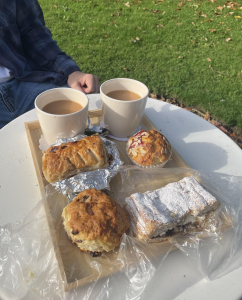 During every minute of downtime this week, I have considered what to write about for this blog. As it is the midterm one, I felt that it should be a thorough overview of my feelings about the semester and details about things that I’ve learned and or noticed about myself and my surroundings. While I tried my best to put all of my thoughts together and into words, I’m sure that there are many other things that I have forgotten to write about, as I am the only one prompting myself, and I fear that I have forgotten some of the things that I told myself to write about. For example, I used to think that it was strange to drink tea with milk, but now I prefer it, and always with a biscuit on the side if possible. I cannot claim to be Irish or European, but I truly appreciate many of the aspects of their culture, and I plan to implement some of the things that I have learned into my life back in the US. I have already begun my reusable bag collection, so look out for this fashion icon ; )
During every minute of downtime this week, I have considered what to write about for this blog. As it is the midterm one, I felt that it should be a thorough overview of my feelings about the semester and details about things that I’ve learned and or noticed about myself and my surroundings. While I tried my best to put all of my thoughts together and into words, I’m sure that there are many other things that I have forgotten to write about, as I am the only one prompting myself, and I fear that I have forgotten some of the things that I told myself to write about. For example, I used to think that it was strange to drink tea with milk, but now I prefer it, and always with a biscuit on the side if possible. I cannot claim to be Irish or European, but I truly appreciate many of the aspects of their culture, and I plan to implement some of the things that I have learned into my life back in the US. I have already begun my reusable bag collection, so look out for this fashion icon ; )
Welp, I apologize for my long-winded self, but I do hope that you found this to be at the very least entertaining if not interesting. I cannot wait to see what part two of this semester has in store for me, and I should also start buying souvenirs for people back home… I’m not very good at that, but maybe if I plan ahead, I can find things that are actually useful for them. There’s nothing worse than getting a souvenir from someone else’s travels that will just sit around your house. They are what I would consider the opposite of a great conversation starter. A conversation ender.
“Oh, a (insert random knick-knack here) from (insert foreign place here)! Have you been?”
“No.”
End of conversation. Wow, there’s yet another tangent. I really should let you go before I start writing my grocery list for the week…
Peace and love!
Mathilde
*Yes, like from Napoleon Dynamite and duh, of course she’s a Honda 🙂
**While I have noticed the difference in taste, I did have to do some more research about the regulations around HFCS, so here is the website that I used: HFCS
Why does time go by so quickly?
/in Berlin, Germany Fall 2025 WagnerAll right, it’s halfway through the semester, and I feel…amazing! Actually, I’m sad to think that my experience is already halfway over. The reason I wanted to study abroad was because I wanted to find peace with myself, and I really think that I have. With such a busy college life that I choose to live on MLC’s campus, I haven’t felt like myself in a while. I found it easy to get bogged down by homework, work, sports, meetings, etc. but here, in Berlin, I just see the beauty in every moment.
Besides school hours, barely any of my days are planned here, and I intended to do that. I’m learning to go with the flow over here, even though Germany is actually very punctual. I like the quiet dinners with my host family and journaling in my room at night. I like when we go out and see the sights of Berlin or explore a new city on the weekend. I like pausing for a movie and running to catch the train. I love every moment.
What I’m happiest about is that I’ve learned to be proud of trying things. The other day I ran a 5K just to see if I could do it; and I can! Also, my host loves table tennis, and although I’m not the best, I still go to practice with him. Let me tell you, learning the art of a new sport in a different language is such a unique experience! And I got to meet so many more amazing people over here. Trying new things has opened so many doors to me that I didn’t know I would be blessed with.
Another thing I really wanted to focus on was seeing the beauty of God in every moment. His creation is beautiful, and I’m so honored that I’ve gotten to see so much of it. Whenever I explore a new city, it’s all I think about. God is good all the time, and all the time, God is good.
I’ve also had so many laughs this semester so far. I was really nervous about not having a good time over here, and one of my goals was to laugh every day. I’m happy to say that usually I laugh before I even get off my morning bus. And if that doesn’t do it, I have quite a few class clowns in my German class.
Of course, there are always areas of improvement to be had. I know good relationships take time, but I hope to get a lot closer to my host family before moving stateside again. They truly are amazing people, but I often psych myself out of things. Sometimes, I stay in my room when I think time would be better spent talking to them.
I’ve also noticed a lull in my eagerness to get better at the German language. I often think to myself, ‘most people know English anyways.’ But if I’m ever going to grow this skill, this is the best place in the world to do it! I’ve heard kids’ TV shows can help with vocabulary, so I’ll be giving SpongeBob Schwammkopf a try.
I also want to do a better job of reaching out to the people I have back home. Before leaving, I was so afraid that they would forget about me…turns out, I haven’t done the best at keeping up with them. A simple message goes a long way, and I want to send one when I think of someone.
Every time I think I know everything about the German culture, I get surprised with something new. It’s my host dad’s birthday this week, and when I mentioned getting him a card, I was informed they don’t really do that here in Germany. It’s more of a thing you say to the person.
I’m still in love with the transportation in Germany and the efficiency of its people. But when I got here, the rules weren’t written on a billboard you could just read somewhere, so they were very difficult for me to understand. However, through a lot of people-watching, I think I’ve figured out most of the social cues.
Overall, I feel like I’m growing in all the ways I hoped I would! I’m learning to slow down, appreciate the moment, and be grateful for the beauty around me. The first half of this journey has been incredible, and I can’t wait to see what the second half brings!
